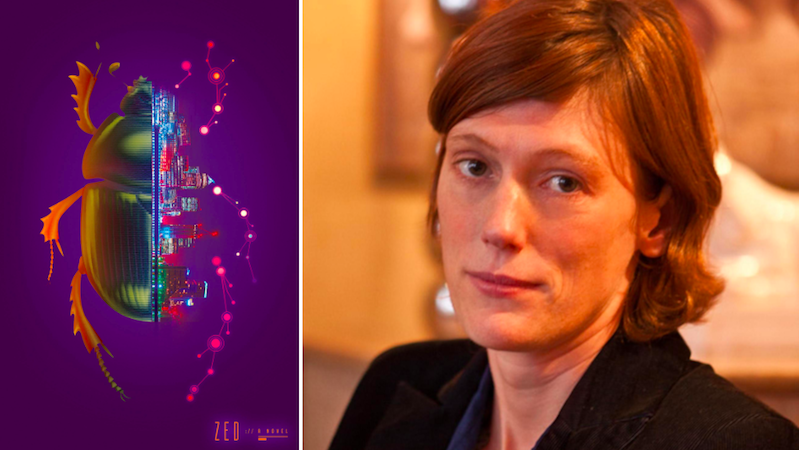
Joanna Kavenna’s Zed is published this month. She shares five works of absurdist fiction, noting that this work “is based on the tragi-comic tension between our mysterious and finite existence and the poignant way we quest avidly for meaning, despite everything. Each one of these novels/stories centers around the plight of individuals within a universe that fundamentally makes no sense. Either there are no rules at all or the rules keep changing, for no apparent reason.”

“The Overcoat” by Nikolai Gogol
In Gogol’s “The Overcoat” our poor protagonist spends the entire book questing urgently for a warm new coat, in order to be spared the ridicule of his colleagues and the asperities of the Russian winter. He gains this prize, is blissfully happy for one evening and then is instantly robbed of his coat, for no reason except that the universe is quite insane. His ghost haunts all those with overcoats evermore. This is hilarious and awful at the same time.
Jane Ciabattari: Akakiy Akakievitch’s works at his bureaucratic copying job “like a horse in a mill,” and gets no respect from those he works with. He gives “no thought to his clothes,” and only begins to think of replacing his cloak when it is so threadbare he suffers greatly from the Northern cold. “Akakiy Akakievitch’s cloak served as an object of ridicule to the officials,” Gogol writes. “They even refused it the noble name of cloak, and called it a cape. In fact, it was of singular make: its collar diminishing year by year, but serving to patch its other parts. The patching did not exhibit great skill on the part of the tailor, and was, in fact, baggy and ugly.”
How does Gogol set up his own slant on his narrator’s obsessive quest?
Joanna Kavenna: It’s Gogol’s exquisite tone—of total, devastating irony. It’s absurd, the whole thing—that we are here for this brief finite moment, and no one knows what the hell is going on, and yet some crazy wicked mortals try to oppress others, bind them into iniquitous and evil regimes, and really who do these people think they are?—when the universe is so strange and unknowable! I love that deeply ironic tone and it’s intrinsic to most of the writing I return to over and over again—Isaac Babel, Franz Kafka, Virginia Woolf, Yevgeny Zamyatin, Ithell Colquhoun, Daniil Kharms, Leonora Carrington, Samuel Beckett, Flann O’Brien, Dino Buzzati, Thomas Pynchon, Roberto Bolano, Margaret Atwood, Enrique Vila-Matas as well as the other writers we’re discussing here.
In Gogol’s writing it’s never quite clear where the comedy ends and the tragedy begins. Or, rather, the two states are indistinguishable. Akaky’s mock-heroic quest is for an overcoat and why should this be such a major enterprise? His society is so foolish and cruel that despite his great efforts even this small thing is denied him. It’s insane, but he’s told it’s all quite sane, which is even more insane. I also love the way Gogol steps out of realism all the time, so after Akaky’s death his ghost appears to those who have wronged him, those with overcoats, and his spectral fingers tear at their collars. As if Gogol is saying: if you mad people are going to drag me into this overarching lunacy, then I’m going to make up my own rules about reality, so there…!
I first read the story when I was working in Tallinn and took a train to St Petersburg. I rented a room from a very elderly woman who turned out to be a distinguished professor with an expertise in electromagnetism. She was a keen reader of Russian fiction and slept under a picture of Tolstoy. She gave me a piece of advice which I’ve always assiduously ignored: ‘Woman are nothing, absolutely nothing. You should give up now.’ The professor had ignored her own advice anyway: she hadn’t given up in any sense and worked indefatigably all her life. So she was an ironist also, and it’s no surprise she liked Gogol.
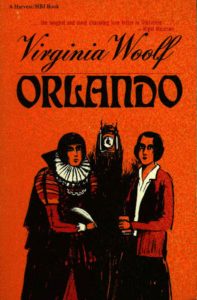
Orlando by Virginia Woolf
In Woolf’s Orlando nothing is very certain, even the parameters of time, self and space. Orlando moves through centuries of history, once a man and then a woman, revealing the strange and fleeting conventions by which we live.
JC: Woolf wrote about the early glimmerings of Orlando in her diary: “A biography beginning in the year 1500 and continuing to the present day, called Orlando. Vita; only with a change about from one sex to the other.” What are your favorite “centuries” or sections?
JK: There are so many! Again I love her wry, ironic, brilliantly erudite tone. Woolf parodies the idea that there can be a single objective account of reality and history. She begins with the standard protagonist of literature-through-the-ages—the wealthy, self-confident male—and subverts him wildly. “He—for there could be no doubt of his sex—though the fashions of the time did something to disguise it…” There’s a great scene after Orlando has become a woman, as she sits impatiently onboard a ship, amazed by the stymying conventions imposed on her sex—the restrictive clothing, the enforced passivity. At one point, she twitches her skirts, and this brief vision of her leg almost causes a sailor to plunge from a mast, and she realizes the situation is actually worse than she thought, that her society is so repressed that the merest glimpse of a woman’s flesh can nearly murder a man…Also I love the irascible poet Nick Green, who turns up in every epoch, enviously deriding his fellow writers and complaining that the Golden Age of literature is over.
I first read this book shortly before I went to university. One day I went to visit Monk’s House, Woolf’s home in Sussex. It was the height of summer and the countryside was so verdant, the sky a deep endless blue, not a cloud anywhere. Woolf left Monk’s House on 28 March 1941, to drown herself in the River Ouse. As I travelled I kept thinking about the note Woolf left for her husband Leonard—“You have given me the greatest possible happiness. You have been in every way all that anyone could be. I don’t think two people could have been happier till this terrible disease came. I can’t fight any longer…” I couldn’t stop thinking about those lines—the love and agony they express. I got to Monk’s House and walked into the living room, where everything is arranged as if Woolf had recently left. It seemed so terrible that Woolf had despaired entirely, even with her genius and greatness, and to my surprise I started weeping copiously, like some sort of crazy super-fan. It was almost funny, because the whole thing was quite ridiculous, but I associate Orlando with that febrile day. And yet, paradoxically, it is the most joyful and exuberant book.
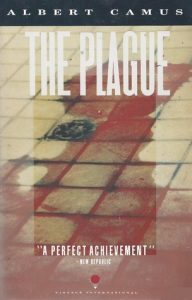
The Plague by Albert Camus
Camus’s The Plague is one of the great absurdist classics. It asks how we can live, how we can do anything, when life is entirely lacking in purpose and meaning. The answer is bleakly consoling: because everyone else has to live in the same universe, under the same absurd conditions, no one escapes and therefore we must play our part, even though we don’t even know the rules of the game.
JC: Camus is thought to have been writing about the rise of the Third Reich, although The Plague also could apply to literal epidemics like those caused by the Ebola virus. Do you think we’re facing a similar pestilence today?
JK: Yes, that’s absolutely right—that Camus wrote about the plague of fascism and perhaps also literal plagues—cholera, etc. Also there’s a philosophical question intrinsic to this novel—if life is absurd and there is no meaning, then why bother doing anything, why not just abandon hope and wait for the end? I read it first when I was 14 or so. My parents both came from working class families where no one ever got the chance to finish school. They both read compulsively, and our house was full of books, and there was no real order to these books, no hierarchy of taste or status. One day I had an existential crisis and asked my mother what the meaning of life was anyway and she handed me Camus’s The Plague. Her point, sensibly made via Camus, was that the problem is general not specific. Camus’s characters keep trying to resist the plague, despite their great suffering, despite the fact their situation is impossible. Like that old Beckett adage, also a classic piece of compassionate absurdism: “Ever tried. Ever failed. No matter. Try Again. Fail again. Fail better.”
Are we facing a similar pestilence today? In Europe and America we see the rise of Trumputinism and the emergence of a political class of hyper-nationalist cybertrolls, who lie with impunity, not caring if their lies are exposed. In India (where I’m writing from) the journalists I’ve been speaking to say that they risk punishment, reprisals if they criticize the nationalist Modi government. Journalists, political activists, protestors are being killed across the world, to prevent them from holding governments and powerful individuals to account. There are plagues upon plagues, you could say. A couple of months ago leaked documents revealed China’s imprisonment, punishment and brainwashing of members of the Uighur community. This is defined as “voluntary reeducation,” which is entirely Orwellian. There is the pestilence, also evident in China, of tech-totalitarianism, where new technologies of mass surveillance are used to control populations, to limit freedom in line with the overarching ideology of a given regime. If you combine this sort of omniscient technology with a plague of fascism, what happens? The dystopia is plainly apparent, and it is political and philosophical—as Camus discerned.
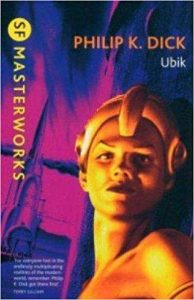
Ubik by Philip K. Dick
Philip K. Dick is another seminal absurdist, and Ubik is his greatest novel. A weird substance called Ubik seems to stop reality from dissolving altogether, so long as the characters keep finding it and applying it to every insane version of reality in which they find themselves. Yet, in this absurd universe, no one is even entirely certain if they are alive or dead.
JC: Time reversion, corporate espionage, cryogenic “half lives,” and an agency tasked with fighting against telepaths specializing in invasion of privacy. Joe Chip works for the anti-psis; his boss, Runciter, notes toward the end of the book, “Here’s what happened. We got lured to Luna. We let Pat Conley come with us, a woman we didn’t know, a talent we didn’t understand—which possibly even Hollis didn’t understand. An ability somehow connected with time reversion; not strictly speaking, the ability to travel through time … for instance, she can’t go into the past either; what she does, as near as I can comprehend it, is start a counter-process that uncovers the prior stages inherent in configurations of matter.” Maybe Joe Chip is dead. Maybe Runciter is dead. You can’t pin down reality. Dick wrote his book in the 1960s. Do you think it’s even more relevant today?
JK: Yes, Philip K Dick is so superb, and always relevant. He once said that he wasn’t really a novelist, more a fictionalizing philosopher. He used the capacious form of the novel to explore philosophical questions, such as how we can tell if something is real and even—in Ubik—how we can be sure if we are alive or in a half-life state or weird simulation. Can we trust the evidence of our senses? Does the mind keep trying to find rational explanations for totally irrational events? What are these so-called certainties on which we depend? Are they absolute truth, or just ossified convention? In Ubik the characters are adrift in a peculiar universe in which the rules keep changing, or perhaps there aren’t any rules at all. These questions recur throughout Dick’s books. In Valis the protagonist Horselover Fat makes a series of reasonable points about uncertainty and how perhaps we cannot express the limits of language in language itself, and his doctors respond by saying “There there, let’s increase your medication…”
I think the metaphysical and political questions Dick is posing are highly relevant today, as we inhabit a hall of mirrors, the worlds of VR and also real virtuality, in which unreal forms seep into the so-called real, and corporeal and incorporeal realms are strangely merged. If our senses tell us that we are in one sort of reality, then is that enough? What happens if they start telling us that we are in a reality that can’t, actually, be real? Dick’s recurring philosophical questions are similar to Gogol’s, similar to other absurdists—if reality is real then why does it feel so eerily unreal? Also, at the risk of using “irony” an ironic number of times, Dick’s ironic style is wonderful as well.
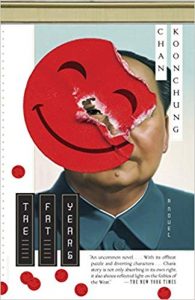
The Fat Years by Chan Koonchung
Chan Koonchung’s The Fat Years is a very bold satire of contemporary China, disguised as existential absurdism. A month has disappeared from collective memory! What could be more absurd? Or—in a totalitarian regime—more sinister?
JC: This is a chilling book, published in Hong Kong in 2009, banned in China, and mixing together the reality of China’s economic power, including owning Starbucks, and its technological abilities—surveillance, DNA, AI, all able to be put to use to maintain control over a superpower that has erased the history of the Mao era and twists today’s reality. What was your reaction when you first read it?
JK: The Fat Years is a Huxley-esque fable about a fictional (but recognizable) tech-totalitarian society in which people exchange freedom for prosperity. And Chan asks: Is this really what we want? Isn’t freedom actually more important, in the end? His characters have slipped into collective amnesia—they have forgotten disturbing and revolutionary events, things that actually matter. There’s also an excellent satirical portrait of a vain, self-obsessed novelist, Old Chen, who just wants to sit around in the local Starbucks drinking lattes and musing portentously on the future of fiction. As ever the insane people are in power and the sane people are regarded as lunatics and failures. Eventually Old Chen is forced out of his lassitude into a far more disturbing and more accurate understanding of the society around him.
I first read this book a few years ago when I was in Hong Kong visiting my relatives there. As you mention, the book has been banned in mainland China, but it was available in Hong Kong and it was moving to see how eager people were to buy that book. They were coming over from mainland China, expressly to buy physical versions of banned books because it is too risky to download them online. More recently we have witnessed the protests in Hong Kong, where the students are enduring great asperities to defend their freedoms. The freedom not to be controlled by surveillance tech, not to be forcibly brainwashed, not to be arbitrarily imprisoned like the late Nobel Laureate Liu Xiaobo, or Liao Yiwu or Ai Weiwei. The freedom to read brilliant satirical novels that aren’t to the taste of the Politburo; to write these novels themselves.
*
· Previous entries in this series ·
If you buy books linked on our site, Lit Hub may earn a commission from Bookshop.org, whose fees support independent bookstores.

